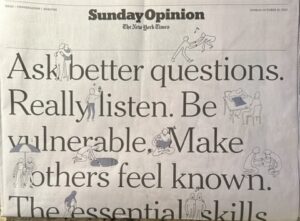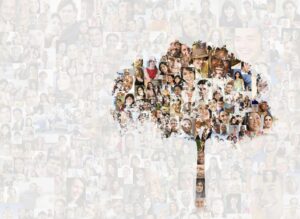What’s your story?
We all have one and it contains the seeds and secrets of who you are. The question is: Do you want to share your story with others? Do you want others to know, really know you?
Recently, I read an article by the New York Times columnist David Brooks entitled The Essential Skills for Being Human. It’s an eloquent description on what it takes to build relationships steeped in trust – stuff like genuine curiosity about people, honesty about yourself, the courage to be vulnerable, the ability to listen to someone, deeply. Practicing these and other skills is what it takes to get individuals to open up, to tell you their story, and for you to hear it.
People’s stories, no matter how simple, complicated, heart-wrenching or ‘normal’ they may seem, are blessings conferred upon you by them, and whom you honor in hearing them.
Dinner conversations
In the past few years, when my wife and I were out to dinner, she’d often, without warning, look the waiter squarely in the eye and ask: “What’s your story?” Nine times out of ten, the waiter would stop what they were doing and, with little prompting, tell us.
One young woman, her name was Sarah, was waiting tables in the Berkshires over the summer to help pay for college. Her dream was to go to law school. In Boston. At Harvard. Like her father and grandfather had. As she spoke, her face seemed to glow, as though she was just waiting for someone to ask her about herself. In that moment, a new, if fleeting, bond was formed.
To honor the individual inside the person – as a way of truly seeing him or her – is the first step in humanizing the relationship, whether it’s brand-new or decades old …
Trust yourself
In my coaching work, I’ve met people who fear that their story is ‘bad’ and, therefore, don’t want to share it. They had a tough childhood. Their parents often ignored them. They were poor students or got into occasional fights in school. Or they had had five jobs before they were 25. None of this matters. These are events, not the story itself. Your story is contained in the answers to this question: What did you learn from these events and how did they affect you? Taken together, how did they make you a stronger person? In short, there are no bad stories, just life events that inform that story.
My story revolves around all things visual: sight, vision, eyes, perception, seeing, discernment. When I was four years old, I underwent eye surgery to correct a muscle problem; I was born cross-eyed. Medically speaking, the operation was a success, but during that operation the course of my life was altered forever.
As I lay alone on the operating table, I felt I’d been abandoned, as though I’d done something terribly wrong and needed to be ‘fixed.’ As my panic grew, I asked myself a question, inside: What is so wrong with me that I must be changed from who I am?
It took many years for me to recall and make sense of this experience. Connecting with my identity and enabling others to do the same has been the governing force in my life ever since. Helping people to see is my purpose. It is my passion.
What do you do?
When you’re at a party or conference and someone asks you, what do you do? Take a breath, pause, and tell them, instead, what you’re passionate about. Tell them what that special contribution is you believe your capable of making. Some people may even say, ‘Tell me more.’ Tell these curious souls how you came to understand that passion. Your story is not about what you do; it’s about who you are.
Stories are no less than gateways to identity: what makes you unique, special, one of a kind, indeed, important. Our stories are what make us human.
In the article cited above, David Brooks writes that people tell him they feel unseen and disrespected. One of the most jarring examples of this sense of ‘invisibility’ is found in these words: “Husbands and wives realize that the person who should know them best actually has no clue about who they are.”
Attention is love
A close friend and coaching colleague recently announced to a group of us that “attention is love.” I didn’t get it at first. But then my friend described how she would remind her late husband of this when he wasn’t listening to her – and then he did. Listening deeply to others and being fully heard, voice to voice and eye to eye, are the currency of attention. As Willie Loman declared in Death of a Salesman: ”Attention must be paid!”
Your story is already written. It lives inside of you, waiting to be told. Find it. Be honest. Be courageous. Maybe, even a bit provocative. Perhaps, someday soon, you’ll be fortunate enough to have someone ask you – So what’s your story?




